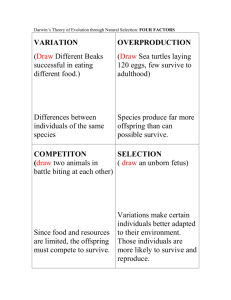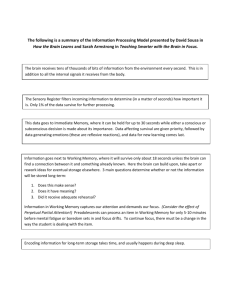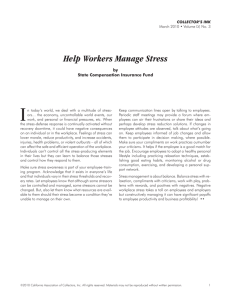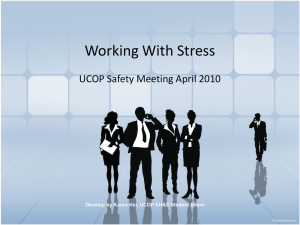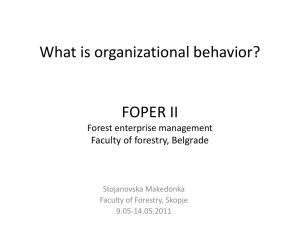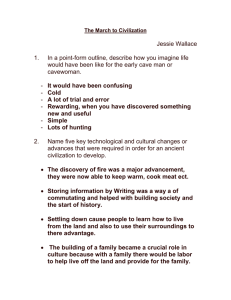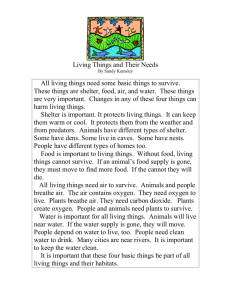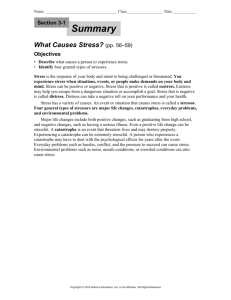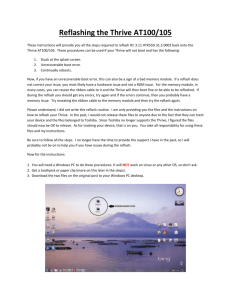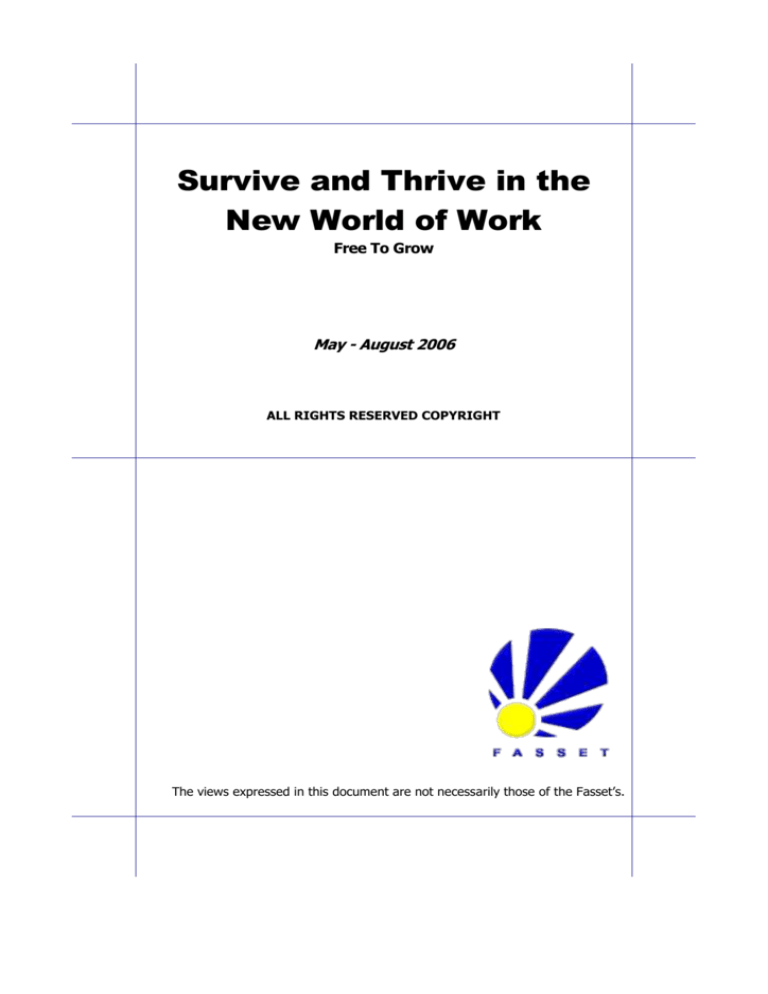
Survive and Thrive in the
New World of Work
Free To Grow
May - August 2006
ALL RIGHTS RESERVED COPYRIGHT
The views expressed in this document are not necessarily those of the Fasset’s.
SURVIVE AND THRIVE IN THE NEW WORLD OF WORK
The world is changing rapidly. Many of the changes have a profound effect on the
world of work. In the “old” world of work, achieving success was fairly straightforward
– one studied, worked hard, and success usually followed. But today globalization,
technology, changes in workplace structures and the nature of work, cultural diversity
and the growing need for a work/life balance amongst other things calls for a new set
of skills if one is to achieve career success. To survive and thrive in the new world of
work it is essential that one adapts to the changing environment by acknowledging
that things are changing, accepting change as an inevitable part of life, and aligning
one’s attitudes and behaviours to exploit the changes to one’s benefit.
A number of skills are required to achieve career success in today’s workplace:
1. INTERPERSONAL RELATIONSHIPS
Three sets of skills are required for career success, cognitive/analytical, technical and
personal/interpersonal skills. The latter are often overlooked, yet many research
studies find that the ability to work with and understand people is the most important
requirement for career success. In the words of Paul Getty: “It doesn’t make much
difference how much other knowledge or experience an executive possesses; if he is
unable to achieve results through people, he is worthless as an executive.”
One has various workplace relationships with many categories of people e.g. one’s
seniors, colleagues, subordinates and customers. You may not like everyone, but
achieving career success requires building and maintaining positive relationships
with all parties. Productive relationships are not the result of luck but of hard work
and developing sound relationship skills is therefore an essential prerequisite for
achieving success in the modern workplace. Building rapport and communicating
openly, yet appropriately, are the key to this.
2. DIVERSITY
Diversity makes good business sense. In a corporate context it is a vital resource
benefiting all. Diverse people in an organization add value - they can complement
each other with their different skills and approaches to things. To maximize the
benefits of diversity for oneself and one’s organization, it is essential to accept,
respect and value others, creating an environment where all feel welcome, valued
and fully utilized. In diversity there is usually a strong focus on people’s differences,
but what is often overlooked is that no matter how diverse, people also have much in
common. To build productive relationships with diverse people and reap the benefits
of diversity, make the effort to find commonalities. Take time to get to know people
personally. This will help you form bonds with others necessary for productive
relationships and to avoid the pitfalls of passing judgments on people who belong to
categories different from yourself.
3. HANDLING INTERPERSONAL CONFLICT
No matter how skilled you are in dealing with people, inevitably there will be times of
conflict - it is part of life and part of any relationship. If handled effectively, conflict can
Survive and Thrive in the
New World of Work
1
bring many benefits to relationships and the workplace. For one, there is a
relationship between conflict and performance levels. Both low and high levels of
conflict impact negatively on performance, the former resulting in low levels of
innovation and involvement and the latter in a destructive and negative work climate.
Medium levels of conflict however can enhance performance, by e.g. generating
fresh ideas, facilitating constructive criticism and self-analysis.
However, inappropriate handling of conflict can have dire consequences. To manage
it effectively, one needs to know when to use the different conflict handling strategies
i.e.
Withdrawing strategy – appropriate when neither the goal nor the relationship
with the other party are important
Forcing strategy – useful when the goal is more important than the particular
relationship
Smoothing strategy – the exact opposite of the forcing strategy i.e. useful
when the relationship is more important than the goal
Compromising strategy – appropriate when e.g. time is tight and a solution is
required, but both the goal and the relationship are important
Problem solving strategy – appropriate when both the relationship and goal
are of high importance and time and resources allow for problem solving
4. ASSERTIVENESS
Closely linked to interpersonal conflict is assertiveness. Inevitably there are times
when one’s ideas, goals, opinions etc will conflict with others’. Some people handle
such situations by being submissive - by just backing off and not in any way make
their needs or concerns known. Others behave in an aggressive manner and try to
intimidate the other party in order to have their needs met. Both of these approaches
are equally detrimental.
Assertiveness is the ability to express yourself and your rights without violating the
rights of others. It is the skill that you will require to impact on others in a selfconfident manner, exercise leadership and deal effectively with criticism and
resistance.
How to assert yourself:
Try to understand the other party and where he/she is coming from.
Explain exactly what it is that is offending or concerning you, being careful not
to attack the other person. Be specific about the problem behaviour. Do not
make assumptions about the other party’s motives, stick to behaviour you can
observe. Try to avoid absolutes, such as always or never.
Use “I” statements. This consists of a description of how you feel and an
indication of the conditions under which you feel that way. It takes this form: “I
feel (your emotions) when (under what condition) because (providing the
Survive and Thrive in the
New World of Work
2
reason). “I” statements are much more effective than “you” statements. They
do not put down, ridicule, blame or judge others.
Negotiate ways to address the problem and state the consequences if the
problem/concern is not addressed.
5. STRESS MANAGEMENT
The new world of work places enormous demands on people to produce and perform
at very high levels. Working environments are increasingly stressful which makes for
potentially high stress levels for employees. To survive in today’s stressful world it is
essential that people:
1. Understand what stress is and how it works – stress is not the situation or
demand but how we respond to it. People differ in their responses - a situation
may be stressful for one person but not for another. Like conflict, there is a
relationship between one’s stress levels and performance. Too little or too much
stress negatively impact performance, but optimum stress levels (Eustress), can
stretch and stimulate one to enhance performance. Key to dealing with stress
effectively is to identify what causes you stress and then learning how to manage
it within optimum levels.
2. Understand the effect stress has on you – the body responds physically to
stressful events as part of its survival mechanism. The long term impact however
of too much stress can be dire and includes e.g. ulcers, heart attacks, high blood
pressure etc. Watch for the physical, emotional, and other symptoms of stress to
avoid burnout.
3. Are able to identify and manage their stressors – stressors are the actual
situations or demands one experiences as stressful. Identify your stressors and
change the way you look at them. Do not focus on what you cannot control and
influence - this leads to frustration. Instead focus on what you can control and
influence. This will leave you feeling more empowered, hopeful and in greater
control.
4. Are able to employ stress management techniques – there are a variety of useful
techniques including:
maintain a healthy lifestyle e.g. eat balanced meals, get enough sleep, avoid
excessive alcohol etc
exercise – this reverses the physiological processes built up when the body
experiences stress and helps to control long term impact of too much stress
relax regularly – this can take many forms e.g. hobbies, music, journaling,
deep breathing and muscle relaxation exercises etc
build and maintain a supportive network of friends, family and colleagues
control your thoughts – negative self-talk works against you, but positive selftalk can help significantly to manage stress levels
Survive and Thrive in the
New World of Work
3

